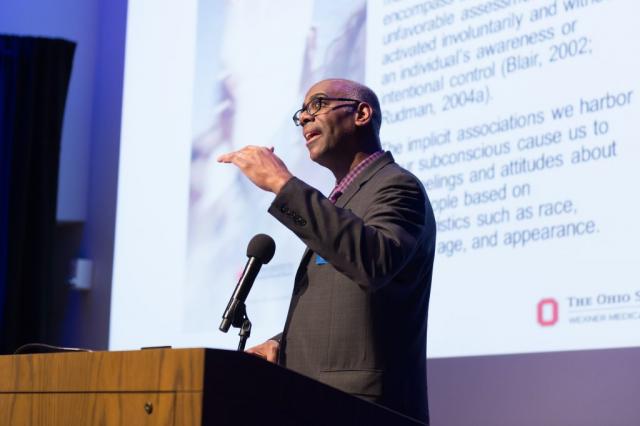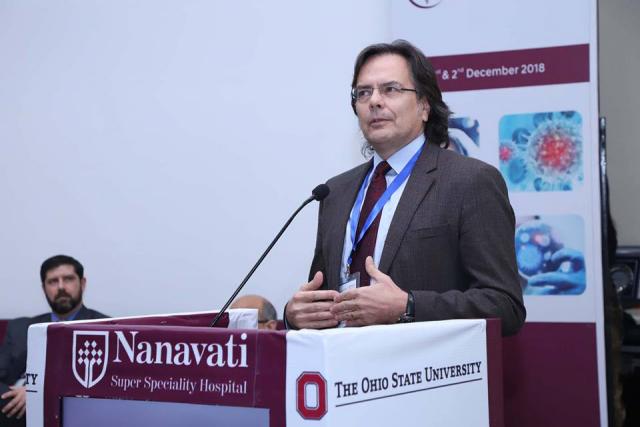
Three Ohio State colleges receive diversity award
Congratulations to the staff and faculty in the colleges of Nursing, Medicine, and Veterinary Medicine who were honored with the 2018 Insight Into Diversity Higher Education Excellence in Diversity (HEED) Award.
Three Ohio State University colleges were honored with an Insight Into Diversity Higher Education Excellence in Diversity (HEED) Award in 2018: the College of Nursing, for the third consecutive year, and the colleges of Medicine and Veterinary Medicine, for the second consecutive year. Ohio State was recognized as the first university to have three health colleges receive the HEED Award in 2017.
Open to all colleges and universities across the United States and Canada, the evaluation measures an institution’s level of achievement and intensity of commitment in regard to broadening diversity and inclusion on campus through initiatives, programs and outreach; student recruitment, retention and completion; and hiring practices for faculty and staff.
One of the many ways faculty and staff in the colleges of Medicine and Veterinary Medicine have contributed to advancements in diversity is by participating in the Advocates and Allies for Equity initiative. Nine College of Medicine faculty and staff have or continue to serve as Advocates: Mark Angelos, Thomas Blincoe, William Buoni, Leon McDougle, Jeffrey Parvin, Tim Pawlik, Tom Ryan, Tom Mauger and Theodoros Teknos. Three Veterinary Medicine professors have or continue to serve as Advocates: Michael Oglesbee, Jeffrey LeJeune and David Wilkie.

Dr. Leon McDougle, chief diversity officer and associate professor of Family Medicine at the Wexner Medical Center and associate dean for diversity and inclusion in the College of Medicine, is highly committed to the initiative and has lead the effort to spread it throughout the medical campus.
"The College of Medicine and Wexner Medical Center leadership are committed to advancing inclusive excellence. Convening Advocates and Allies for Equity facilitations across our 26 college departments and medical center is central to our efforts to cultivate an environment where everyone can thrive," said McDougle. "A diverse and inclusive workforce is required for us to provide optimal healthcare and develop innovative solutions for complex issues. Being aware of our own unconscious bias and ways to mitigate bias are key to improving patient satisfaction and healthcare outcomes."
McDougle believes that collaboration is key to making substantial advances in diversity.
"I along with eight other College of Medicine faculty and staff leaders look forward to continued partnership with Jennifer Beard, director, The Women's Place; Clara Lee, MD, MPP, director, Women in Medicine & Sciences committee; Heather Brod, director, Center for Faculty Advancement Mentoring and Engagement (FAME); and Amy Lahmers, chair of the President and Provost’s Council on Women, to advance gender equity by convening Advocates and Allies for Equity facilitations," he said. "Such collaboration has enabled the OSU College of Medicine to earn recognition by Insight Into Diversity with the 2017 and 2018 HEED awards."
Collaborations and other efforts have lead to additional diversity recognition as The Ohio State Wexner Medical Center and The Ohio State University Comprehensive Cancer Center – Arthur G. James Cancer Hospital and Richard J. Solove Research Institute were also recognized by the Human Rights Campaign as 2018 LGBTQ Healthcare Equality Leaders.

Another Advocate, Dr. Michael Oglesbee, professor, Department of Veterinary Biosciences and director, Infectious Diseases Institute, embraces gender as a key component of diversity in his Advocate role. In addition, he strongly believes that the overall effectiveness of the College of Veterinary Medicine is enhanced when approached in the context of diversity as a whole.
"I believe that our college's success has been fueled by embracing diversity in its broadest form (i.e., race, gender, ethnicity, religion, sexual orientation) versus emphasis on a single demographic," he said.
Oglesbee noted that attention to diversity and efforts to bring about change have shown results in his college.
"I have been a faculty member at The Ohio State University for 30 years, and increases in diversity in the College of Veterinary Medicine over the past 5-10 years have been astounding, particularly in the student ranks," he said. "This does not 'simply happen.' It is created through the concerted efforts of many, and while initial changes were incremental, we are now in what I consider an exponential rate of change. You can more readily enhance diversity when you have a foundation to build upon. We have much to accomplish, but our successes to date have been invigorating."
According to Oglesbee, "Accommodating change starts with awareness and the belief that this is essential to the strength and social relevance of our institution."